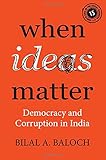When ideas matter: democracy and corruption in India
Material type: TextPublication details: Cambridge University Press New York 2021Description: xxiii, 325 pISBN:
TextPublication details: Cambridge University Press New York 2021Description: xxiii, 325 pISBN: - 9781316519837
- 320.60954 BAL
| Item type | Current library | Collection | Call number | Copy number | Status | Date due | Barcode | |
|---|---|---|---|---|---|---|---|---|
 Book
Book
|
Indian Institute of Management LRC General Stacks | Public Policy & General Management | 320.60954 BAL (Browse shelf(Opens below)) | 1 | Available | 002591 |
Table of Contents
Acknowledgements
Abbreviations
1. Introduction
2. A constructivist approach to political behavior in India
3. The Emergency and the Jayaprakash Narayan Movement
4. India under Gandhi: Populism and partisans
5. Checks and balances and the India against Corruption Movement
6. United Progressive Alliance: Technocrats and transformations
7. The politics of ideas in India and developing democracies
Appendices
References
Index.
Comparativist scholarship conventionally gives unbridled primacy to external, material interests–chiefly votes and rents–as proximately shaping political behaviour. These logics tend to explicate elite decision-making around elections and pork barrel politics but fall short in explaining political conduct during credibility crises, such as democratic governments facing anti-corruption movements. In these instances, Baloch shows, elite ideas, for example concepts of the nation or technical diagnoses of socioeconomic development, dominate policymaking. Scholars leverage these arguments in the fields of international relations, American politics, and the political economy of development. But an account of ideas activating or constraining executive action in developing democracies, where material pressures are high, is found wanting. Resting on fresh archival research and over 120 original elite interviews, When Ideas Matter traces where ideas come from, how they are chosen, and when they are most salient for explaining political behaviour in India and similar contexts.
There are no comments on this title.
